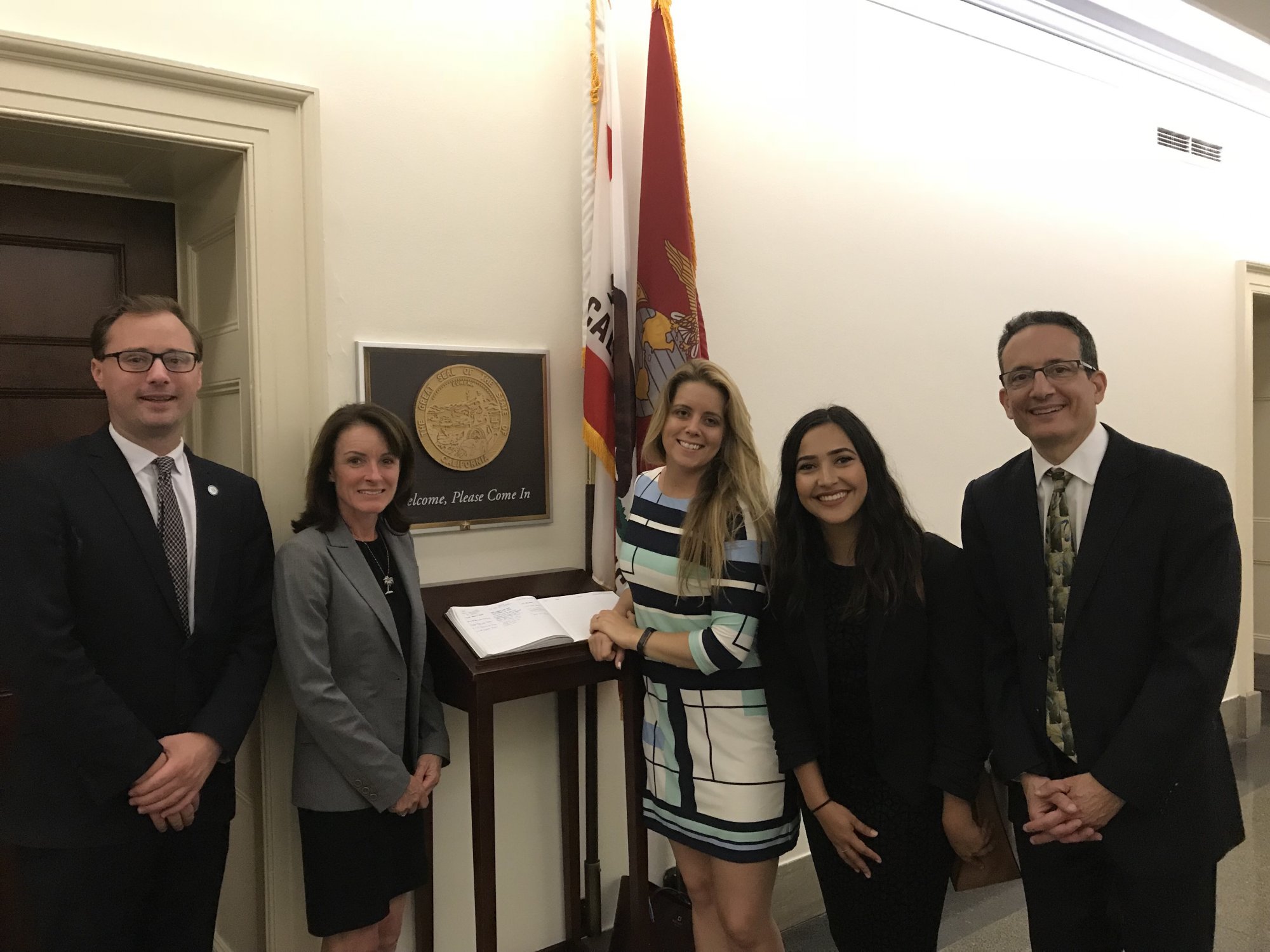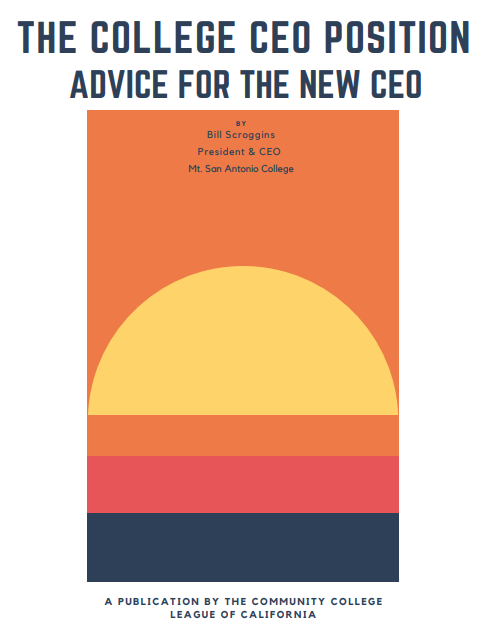In This Issue:
- Bill Endangering Collegiate Athlectics Heads to Senate Education Committee
- League Federal Advocacy in Action
- Join the League's June Legislative Webinar
- 2018-19 Budget Conference Committee Update
- Federal Grant Opportunities - Presented by Downs Government Affairs
- Upcoming Events
Bill Endangering Collegiate Athletics Heads to Senate Education Committee
Later this month, the Senate Education Committee will hear AB 1435 (Gonzalez Fletcher), a bill that puts at risk many of the collegiate athletic programs at higher education institutions, including California’s community colleges.
AB 1435 would create a new one-size-fits-all bureaucracy with significant regulatory powers over collegiate athletics. AB 1435 would create a panel that could craft regulations for all collegiate athletics and have significant oversight powers that are duplicative of the functions of the California Community College Athletic Association (CCCAA) or the United States Department of Education. The panel would have:
- Unlimited investigatory and subpoena powers that could put community colleges out of compliance of federal law.
- Limitless ability to issue fines for perceived violations of panel crafted regulations and no process for institutions to process them.
California’s community college programs have already implemented policies and procedures to ensure the academic success and well-being of our student athletes. Colleges also have extensive policies designed to increase student success or that distinguish us from programs at four-year institutions, such as:
- Full Time Enrollment: All California community college student-athletes are required to attend school full time.
- Concussion and Return to Play Protocols: Community college athletic programs must adhere to strict guidelines regarding when and how an injured athlete is returned to the field of play.
- Coach Tenure: Most community collegiate athletic coaches are full time, tenured faculty. Thus they must meet minimum academic qualifications, teach a full academic load in addition to their coaching duties and cannot be fired for a losing season.
- Ban on Scholarships: By state law, community colleges cannot offer athletic scholarships to their athletes.
- Student-Athlete Recruitment: Community colleges have self-imposed strict limitations on their ability to recruit student-athletes outside their immediate area.
We urge your district/college to share your concerns. Please send letters to the Senate Education Committee by June 20.
League Federal Advocacy in Action
 This week, the League and the Faculty Association for California Community Colleges (FACCC) joined forces in Washington, DC to oppose the PROSPER Act and advocate for DACA students. In meetings with several of our national leaders, the League and FACCC shared the community college federal priorities and highlighted the importance of colleges programs in advancing the workforce and economic mobility.
This week, the League and the Faculty Association for California Community Colleges (FACCC) joined forces in Washington, DC to oppose the PROSPER Act and advocate for DACA students. In meetings with several of our national leaders, the League and FACCC shared the community college federal priorities and highlighted the importance of colleges programs in advancing the workforce and economic mobility.
PROSPER Act to be Heard in Late June:
The U.S. House of Representatives is expected to act on HR 4508, the PROSPER Act, to reauthorize the Higher Education Act. HR 4508 includes a number of concerning provisions that would harm our colleges and the students we serve.
The League urges districts to inform their congressional representatives on the harmful provisions of the PROSPER Act. Below is a template letter of opposition that districts can send to their Congressional leaders.
Below are the most problematic parts of the bill:
- Substantial Increase Liability for Unearned Title IV Funds
- The bill would substantially increase the amount of unearned Title IV grant aid our colleges are liable for when a student receives federal financial aid such as a Pell Grant but withdraws from a class.
- Elimination of Title III-A: Strengthening Institutions Program
- Title III-A is a competitive institutional aid programs that supports colleges with limited that serve underrepresented populations or are located in rural areas. The elimination of this program will restrict the ability of colleges to make continued programmatic investments that improve student success and equity.
- Reduction of Financial Aid Resources for Students
- PROSPER eliminates many important financial aid programs that enable our students to attend college. Specifically, it proposes to eliminate:
- Supplemental Educational Propitiating Grants (SEOG).
- In-school interest subsides for low income federal student loan recipients.
- Time based and public services loan forgiveness programs.
- PROSPER eliminates many important financial aid programs that enable our students to attend college. Specifically, it proposes to eliminate:
Movement on DACA:
A possible vote is expected in the U.S. House of Representatives around DACA bills after mounting pressure from both moderates and conservatives to take some action on immigration reform. House Republicans will vote on two immigration bills that include provisions for Dreamers. The floor votes are an effort to stop an immigration discharge petition being advocated by a growing list of Republicans and Democrats. One of the proposals the House will consider is a measure drafted by Judiciary Committee Chairman Goodlatte and the second is a compromise package by Speaker Ryan in consultation with moderate and conservative Republicans.
Join the League's June Legislative Webinar
Join the League's Government Relation staff for a webinar to hear about key policy and budget efforts being considered at the state and federal level. Updates will include efforts to oppose the PROSPER Act, key state bills affecting community colleges, and a summary of the 2018 Budget Act.
June Legislative Webinar Details:
Tuesday, June 19
10:00 - 10:45 a.m.
Webinar Details
Link: bit.ly/LeagueGRWebinar
Dial your telephone conference line: 1-913-312-3202
Passcode: 343385
For more information, please contact Lizette Navarette at Lizette@ccleague.org.
2018-19 Budget Conference Committee Update
On Friday, June 8, the Assembly and Senate met as part of the Budget Conference Committee. A compromise was reached on the differences between the Assembly and Senate versions of the budget bill and each chamber is expected to vote on the final version of the 2018 Budget Act by June 15.
Below is an overview of the California Community College budget as approved by the Conference Committee, and for a chart with the full Budget Conference Committee agreement, click here.
Online College:
The Budget Conference Committee approved the Senate version with modifications, including:
- $100 million one-time Proposition 98 and $20 million ongoing Proposition 98 to create a new online community college to be administered by the Board of Governors. The new college would develop courses and programs that lead to short-term credentials and certifications with labor market value and are not duplicative of programs offered at existing colleges.
- $35 million one-time Proposition 98 to the Online Education Initiative for competitive grants to community college districts to develop online programs, courses and content.
- Establishes a timeline for accreditation by requiring the new college to provide evidence to the Department of Finance and the Legislature that it has achieved accreditation candidacy or pre-accreditation by 2022 and full accreditation by 2025.
- Prohibits the new college from charging fees higher than a traditional college.
- Requires new college to develop short-term programs that lead into pathways offered at existing community colleges.
- Requires the Chancellor's Office to review and make recommendations on (1) noncredit funding rates, and make recommendations to encourage the development of competency-based programs, and (2) the statewide approval process to offer online courses under a flexible calendar.
Community College Funding Formula:
On a unanimous vote, the Conference Committee adopted the following compromise to on the adopts a new formula for community colleges that includes the following:
- Approves prior amendments taken proposal to include a new “stability” provision, which specifies (as a permanent part of the formula) that, each year, a district would receive the greater of their past year or current year funding and removes includes any changes to existing provisions related to counts of summer enrollment. (Therefore, current practices continue and districts have flexibility to shift summer FTES.)
- A three-year phase-in that begins by providing 70% enrollment-based funding, 20% funding based on the enrollment of low-income students, and 10% funding based on performance outcomes. Over a three-year period, the formula would shift to 60% enrollment-based funding, 20% funding based on the enrollment of low-income students, and 20% funding based on performance outcomes.
- A hold-harmless provision that will guarantee all colleges at least a cost-of-living increase for three years. The conference compromise provides an increase to community college apportionments of $378 million Proposition 98 in 2018-19. Of this funding, $151 million is for the base allocation, $24 million is for the hold- harmless provision, and $34 million is one-time discretionary funding for colleges.
- A definition of low-income students that includes all students eligible for the Pell Grant or the California Promise Grant (formerly BOG Fee Waiver.)
- A blended equity success measure that rewards colleges for successful outcomes for both Pell-eligible and California Promise Grant students.
- The May Revision success metrics, which reward colleges for associate's degrees awarded, associate degree for transfer's awarded, certificates of 18 or more units awarded, completion of 9 or more CTE units, transfers to any accredited four-year institution, completion of transfer-level math or English, and attainment of a living wage. Extra points are earned for any of these successes for low-income students.
- The creation of an oversight entity, with representatives chosen by the Governor, Senate Rules Committee and the Speaker to continually monitor implementation of the funding formula and make recommendations to the Legislature, Governor and Chancellor for its improvement.
While not part of the Conference Committee discussions, the 2018-19 Budget Act does include funding for two League priorities:
Financial Aid Technology & Innovation – The landscape of financial aid is changing rapidly at community colleges with increased responsibilities placed on financial aid offices for which they are unprepared to absorb. The budget provides an augmentation of $5 million ongoing and $13.5 million one-time for technology advancement and innovations to modernize our financial aid systems.
Open Educational Resources – The budget includes an investment of $6 million in one-time funds for a statewide effort open educational resources (OER) to be led by the Academic Senate (ASCCC). It is an important step to combating the high cost of textbooks.
The full Assembly and Senate are expected to vote on the final version of the 2018 Budget Act by June 15. Governor Brown will have until June 30 to sign the 2018 Budget Act.
New Publication: The College CEO Position
 Check out the League’s new publication! The College CEO Position: Advice for the New CEO, was written by CEOCCC Board member and Mt. San Antonio College Superintendent/President Bill Scroggins.
Check out the League’s new publication! The College CEO Position: Advice for the New CEO, was written by CEOCCC Board member and Mt. San Antonio College Superintendent/President Bill Scroggins.
Click here to read the publication
Federal Grant Opportunities
Presented by Downs Government Affairs
Check out the League’s full list of federal grants available to community colleges! Visit our Federal Grants page at: www.ccleague.org/federal-grant-opportunites
Upcoming Events
- Classified Leadership Academy, June 14-16, Ventura, CA
- 2018 Annual Convention Proposal Deadline, June 18
- League Legislative Webinar, June 19
- Consultation Council, June 21
For more information, contact the League's Government Relations and Communications staff:
Lizette Navarette, Vice President | lizette@ccleague.org
Ryan McElhinney, Legislative Advocate | ryan@ccleague.org
Laura Murrell, Communications Manager | laura@ccleague.org
Gerson Light-Sanchez, Legislative Fellow | fellow@ccleague.org







